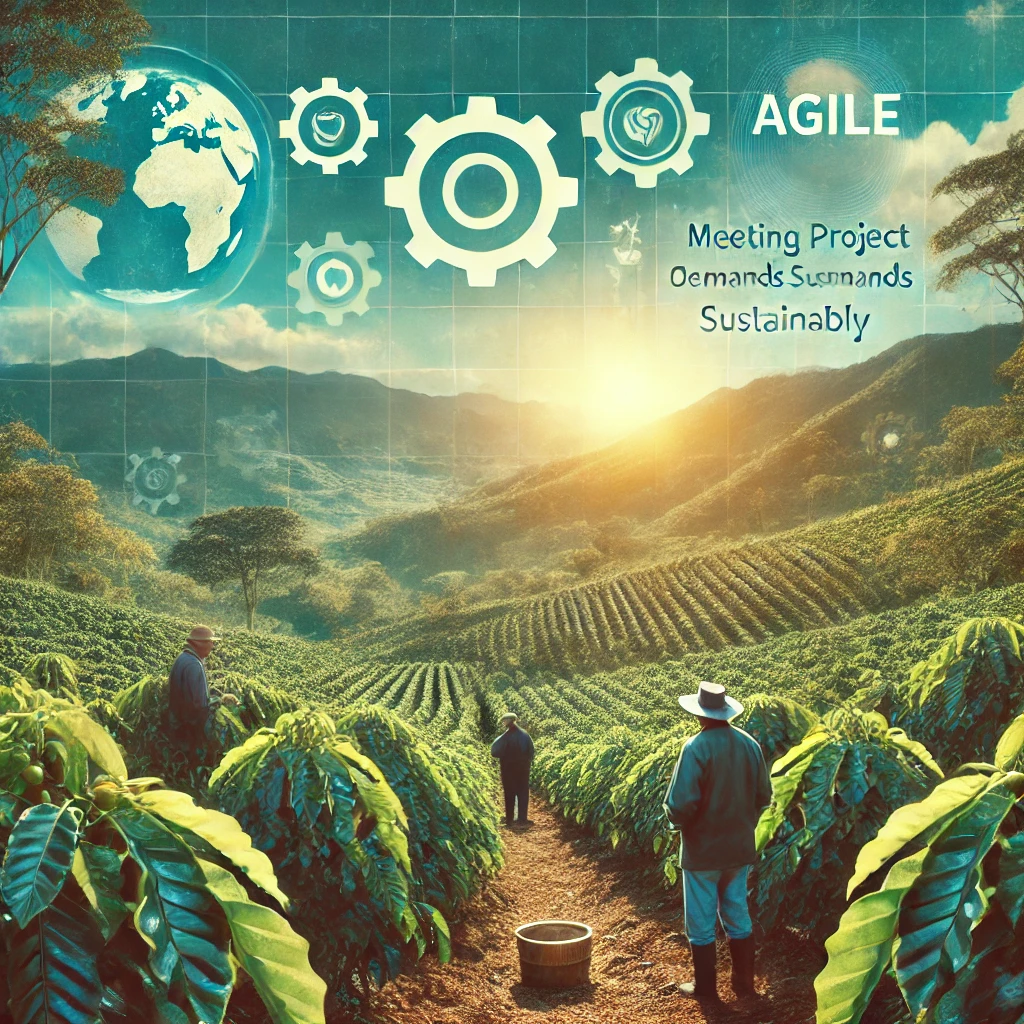
Honduras, a global leader in coffee production, faces unique challenges in meeting international demand due to unpredictable climate conditions and shifting market preferences. With the growing need for flexibility, agile project management of coffee internationally in Honduras offers a modern, adaptable approach to tackle these issues, enhancing productivity and sustainability while aligning with global market demands. Here, we explore how Agile methodologies are transforming coffee production, distribution, and quality control for Honduran coffee farmers and exporters.
What is Agile Project Management?
Agile project management is a dynamic, iterative approach to managing projects, originally developed for software but now widely used across industries. It’s built on principles of adaptability, collaboration, and continuous improvement. By breaking down projects into smaller tasks, known as “sprints,” Agile allows teams to pivot quickly and address challenges as they arise. For the Honduran coffee industry, Agile offers a way to adjust swiftly to changes in weather, market demand, and consumer trends.
Why Coffee Production Needs Agile
Traditional coffee production follows lengthy cycles, from planting to harvest and distribution. In today’s fast-paced world, these long cycles create challenges for coffee producers who must respond rapidly to fluctuating market demands and environmental conditions. Agile project management of coffee internationally in Honduras allows coffee producers to break down these long cycles into manageable phases, promoting a flexible response to any unexpected hurdles in production or distribution. The benefits of Agile extend from the farm to the global coffee market, improving efficiency, consistency, and customer satisfaction.
Overview of the Coffee Industry in Honduras
Honduras ranks as the fifth-largest coffee producer worldwide, known for its high-quality beans grown across diverse microclimates. Coffee is crucial to the country’s economy, providing income for over 100,000 families and accounting for a significant portion of export revenue. Most of Honduras’s coffee comes from small farms in regions like Copán, Opalaca, and Montecillos, each offering distinct flavour profiles. Yet, despite its reputation for quality, the industry faces volatile coffee prices, climate changes, and sustainability pressures, making Agile methodologies a promising approach to overcome these challenges.
Key Challenges in the Honduran Coffee Industry
The Honduran coffee industry is not without its obstacles, especially in a globally competitive environment. Here are a few of the main challenges that agile project management of coffee internationally in Honduras addresses:
- Climate Variability: With climate change bringing unpredictable rainfall and temperature patterns, crop yields can vary drastically, affecting both production volume and quality.
- Market Fluctuations: Global coffee prices are volatile, influenced by factors like weather, politics, and market demand. This volatility creates financial uncertainty for small-scale farmers.
- Sustainability Concerns: Today’s consumers demand eco-friendly and ethically sourced coffee. Adapting to these preferences is challenging for traditional farms but essential for remaining competitive.
- Supply Chain Delays: Coffee production involves multiple stages and stakeholders, from harvesting to processing and export. Delays in any stage can disrupt the entire supply chain, impacting product quality and customer satisfaction.
Implementing Agile in Coffee Production
Applying agile project management of coffee internationally in Honduras starts with the farming process and extends through processing and distribution. Here’s how Agile frameworks such as Scrum and Kanban help Honduran coffee producers optimise their operations.
- Agile in Coffee Farming: Coffee farmers in Honduras are increasingly using Agile principles to manage climate variability, pest control, and crop yields. Breaking down the farming process into short sprints, farmers focus on specific tasks such as soil analysis or pest prevention. At the end of each sprint, they evaluate results and adjust for the next phase, enabling quicker reactions to weather changes and pest outbreaks.
- Agile in Coffee Processing: Processing coffee beans requires meticulous attention to quality. By implementing Agile’s iterative quality checks, coffee producers can monitor beans at each processing stage, from washing to drying. This continuous evaluation minimises quality issues and ensures the highest standards are maintained from farm to cup.
- Agile in Distribution: The global coffee market is highly competitive and fast-changing. Agile helps Honduran coffee distributors respond to market trends quickly and avoid logistical delays. For instance, if there is a sudden demand for organic coffee in Europe, Agile supply chain methods allow quick adjustments to meet the demand without disrupting the overall process.
Agile and Sustainability in Coffee Farming
Sustainability is a growing priority in the coffee industry, with consumers increasingly choosing brands committed to eco-friendly practices. Agile project management of coffee internationally in Honduras supports sustainability through continuous improvement and adaptability. Farmers can test sustainable methods—like shade-grown coffee or organic fertilizers—in small phases, assess their impact, and scale up the most effective practices across their farms. Agile also allows farmers to measure sustainability in terms of both environmental impact and economic viability.
Case Studies of Agile Coffee Production in Honduras
One example of Agile’s success in Honduras is Café Verde, a leading coffee producer. By adopting Scrum methodologies, Café Verde organized teams to handle each production phase, from harvest to distribution. Regular stand-up meetings allowed teams to address issues quickly, such as delays in processing or quality control challenges. This approach increased productivity by 20% and improved consistency, meeting the high standards expected by international buyers. Other small cooperatives have also adopted Agile practices to improve response times, quality control, and product offerings, particularly in organic and specialty coffee markets.
The Economic Impact of Agile in Honduran Coffee Production
The economic benefits of agile project management of coffee internationally in Honduras are significant. By improving efficiency, Agile enables coffee producers to save resources, boost crop yields, and reduce waste. This increased productivity benefits local communities and contributes to Honduras’s national economy. Furthermore, Agile’s adaptability helps farmers secure better deals and meet consumer demand for premium products, such as organic or single-origin coffees, which often sell at higher prices. The economic ripple effect strengthens rural communities, creating job opportunities and improving quality of life.
Technology’s Role in Agile Coffee Production
Modern technology is integral to implementing agile project management of coffee internationally in Honduras. Digital tools like IoT sensors and data analytics enable farmers to gather real-time data on soil health, climate conditions, and crop status. This data supports Agile’s short-cycle approach by providing actionable insights, allowing farmers to adjust their techniques as needed. For example, real-time climate data helps farmers anticipate weather changes, protecting crops and maximizing yields. These tools also enable better collaboration across teams, streamlining communication and decision-making throughout the coffee supply chain.
Future of Agile in Global Coffee Production
As more coffee producers adopt agile project management of coffee internationally in Honduras, its impact is expected to grow across the global coffee industry. Agile empowers producers to be more responsive to consumer trends, particularly the rising demand for sustainably sourced coffee. The flexibility and iterative nature of Agile also promote innovation, allowing producers to test new coffee varieties, brewing methods, and packaging designs in small steps before expanding successful practices. With the global market for specialty coffee on the rise, Agile will be essential in helping Honduran coffee producers meet these demands.
Conclusion: The Way Forward for Agile in Honduran Coffee Industry
In conclusion, agile project management of coffee internationally in Honduras offers a transformative approach to modern coffee production. By fostering adaptability, collaboration, and continuous improvement, Agile enables Honduran coffee producers to overcome challenges, enhance product quality, and achieve greater sustainability. This methodology not only strengthens Honduras’s position in the global market but also contributes to a sustainable future for the coffee industry. Embracing Agile ensures that Honduran coffee remains a leading choice internationally, satisfying the growing demand for high-quality, ethically produced coffee.






